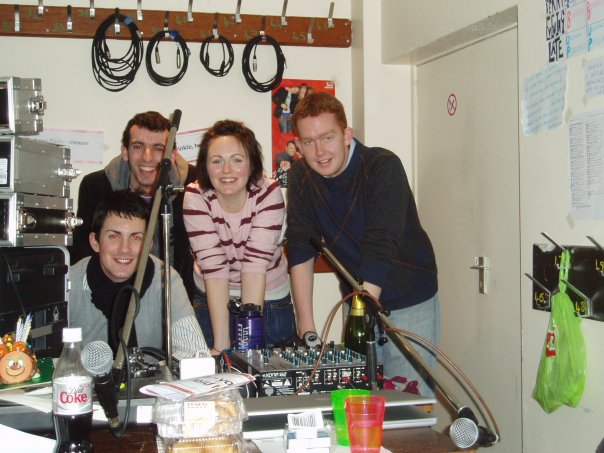Difference between revisions of "2005/06"
| Line 5: | Line 5: | ||
The initial two-week trial period required funding of around £3,000. This was funded by the Rector's Charitable Fund, the University, and the Students' Association. Funding also came from local businesses, which were able to sponsor individual shows. The trial took place in the cloakroom of the Students' Association (Union) building, which was originally designed to house such a facility. | The initial two-week trial period required funding of around £3,000. This was funded by the Rector's Charitable Fund, the University, and the Students' Association. Funding also came from local businesses, which were able to sponsor individual shows. The trial took place in the cloakroom of the Students' Association (Union) building, which was originally designed to house such a facility. | ||
| − | Sandy and Steve graduated that summer, and David Wilkinson was appointed Station Manager. David and eleven other committee members then started planning for the 2005/06 academic year. | + | Sandy and Steve graduated that summer, and David Wilkinson was appointed Station Manager. David and eleven other committee members then started planning for the 2005/06 academic year. Star FM became an affiliated society of the Students' Association. It is not known when STAR became a fully-fledged subcommittee. |
[[File:March 2005 Sandy Walker, Michael Blair, David Wilkinson.jpg|frame|(Left to right) Sandy Walker, Michael Blair, (unknown), and David Wilkinson during the first trial of Star FM, March 2005]] | [[File:March 2005 Sandy Walker, Michael Blair, David Wilkinson.jpg|frame|(Left to right) Sandy Walker, Michael Blair, (unknown), and David Wilkinson during the first trial of Star FM, March 2005]] | ||
Revision as of 01:16, 26 December 2019
STAR was founded as Star FM in 2005 by Sandy Walker and Steve Pidcock, two students who decided that St Andrews really needed a radio station. The station owes a lot to Sir Clement Freud (Rector of the University of St Andrews 2002-2005), who was instrumental in getting STAR off the ground, via the Rector's Charitable Fund.
STAR began with a trial period between 28th February and 13th March 2005, broadcasting on 87.7 FM and standrewsradio.com for six hours each day (8-10am, 7-9pm, and 11pm-1am). [Source: Going Live! Students to launch radio station – University of St Andrews] The FM broadcast required a Restricted Service License (RSL) from Ofcom.
The initial two-week trial period required funding of around £3,000. This was funded by the Rector's Charitable Fund, the University, and the Students' Association. Funding also came from local businesses, which were able to sponsor individual shows. The trial took place in the cloakroom of the Students' Association (Union) building, which was originally designed to house such a facility.
Sandy and Steve graduated that summer, and David Wilkinson was appointed Station Manager. David and eleven other committee members then started planning for the 2005/06 academic year. Star FM became an affiliated society of the Students' Association. It is not known when STAR became a fully-fledged subcommittee.
During the trial period, the website received 15,000 hits per day. This success led to a second two-week period of broadcasting, from 21st November (Raisin Monday) to 4th December 2005, again on 87.7 FM (RSL) and the website, this time with a 24/7 schedule, of which live shows filled 11 hours per day. [Source: Star FM returns to the airwaves – University of St Andrews]
For the second two-week broadcast, the Rector's Charitable Fund covered the cost of the Ofcom RSL license, and a former laundry room in the Union was used as a studio. STAR received advice and support from Brian Paige (Programme Director at Rock FM) and Zane Lowe (DJ at BBC Radio 1). [Source: St Andrews in Focus, Issue 14, Jan/Feb 2006, pg. 6]
STAR continued with two-week RSL broadcasts, implementing new techniques and technology with each one. The third period began on 27th February 2006.
